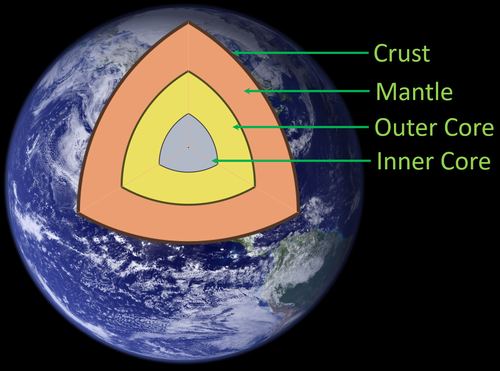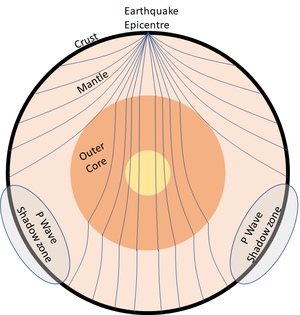Difference between revisions of "Structure of Earth"
(Created page with "==Key Stage 3== ===Meaning=== The '''structure of Earth''' is what the Earth is made from, underneath the surface. ===About the Structure of the Earth=== {| class="wikita...") |
|||
| Line 38: | Line 38: | ||
*[[Outer Core]]: The [[Outer Core]] is a [[liquid]] layer below the [[Mantle]]. | *[[Outer Core]]: The [[Outer Core]] is a [[liquid]] layer below the [[Mantle]]. | ||
*[[Inner Core]]: Underneath the [[Outer Core]] is the [[Inner Core]] at the very centre of [[Earth]]. It is a [[solid]] [[sphere]]. | *[[Inner Core]]: Underneath the [[Outer Core]] is the [[Inner Core]] at the very centre of [[Earth]]. It is a [[solid]] [[sphere]]. | ||
| + | |||
| + | ===References=== | ||
| + | ====Edexcel==== | ||
| + | |||
| + | :[https://www.amazon.co.uk/gp/product/1782945733/ref=as_li_tl?ie=UTF8&camp=1634&creative=6738&creativeASIN=1782945733&linkCode=as2&tag=nrjc-21&linkId=2a2dbec9db6bf5766c0458d908fa0a52 ''Structure of the Earth, page 37, GCSE Physics; The Revision Guide, CGP, Edexcel ''] | ||
Latest revision as of 10:38, 29 November 2019
Contents
Key Stage 3
Meaning
The structure of Earth is what the Earth is made from, underneath the surface.
About the Structure of the Earth
| A diagram showing the layers of the Earth. |
- Crust: The top layer of the Earth is called the Crust. It is made of rocks but two thirds is covered in a layer of water.
- Mantle: The layer under the Crust is called the Mantle. It is made of rock that is under such a high pressure that it behaves plastically.
- Outer Core: The Outer Core is a liquid layer below the Mantle.
- Inner Core: Underneath the Outer Core is the Inner Core at the very centre of Earth. It is a solid sphere.
Key Stage 4
Meaning
The structure of Earth is what the Earth is made from, underneath the surface.
About the Structure of the Earth
- The structure of Earth has been discovered by observing seismic waves.
- Both P-waves and S-waves are refracted as they move through the Earth which gives information about the density underneath the surface of Earth.
- S-waves do not travel through liquids, as they are absorbed, so this can show where there is liquid underneath the surface of Earth.
| This diagram shows the path of seismic waves through the Earth.
P-waves are refracted gradually as they pass deeper into the Earth because the rock becomes more dense the deeper down. P-waves are refracted at the interface between the Mantle and the Outer Core. This causes some P-waves to change direction and results in a 'shadow zone' between 100° and 145°, from their source, where P-waves do not reach seismic detectors. S-waves do not pass through liquids and are not detected beyond 100° from their source. This shows that the core of the Earth must be a liquid. |
- Crust: The top layer of the Earth is called the Crust. It is made of rocks but two thirds is covered in a layer of water.
- Mantle: The layer under the Crust is called the Mantle. It is made of rock that is under such a high pressure that it behaves plastically.
- Outer Core: The Outer Core is a liquid layer below the Mantle.
- Inner Core: Underneath the Outer Core is the Inner Core at the very centre of Earth. It is a solid sphere.

